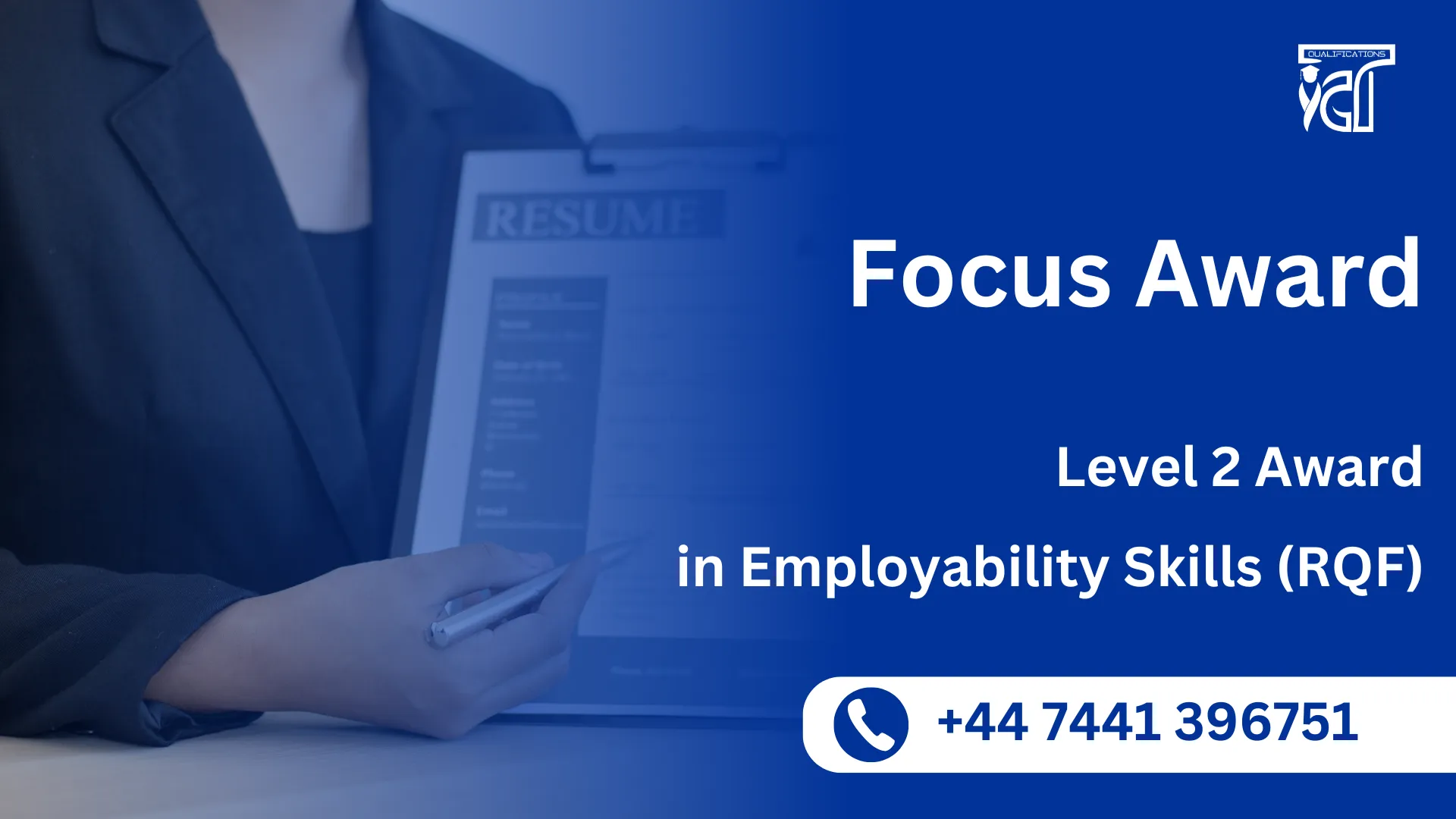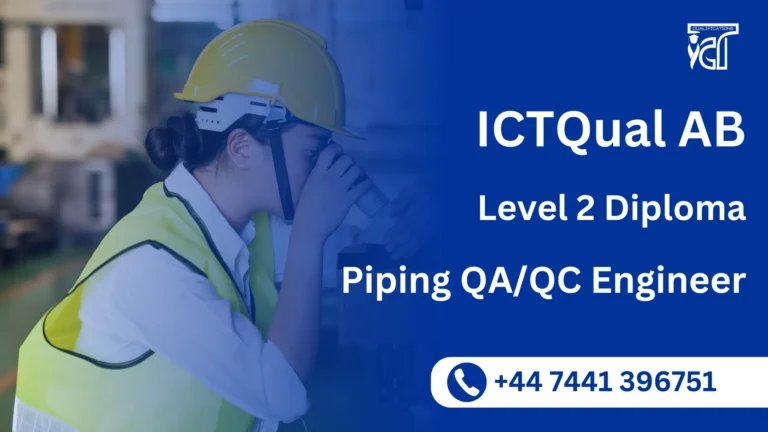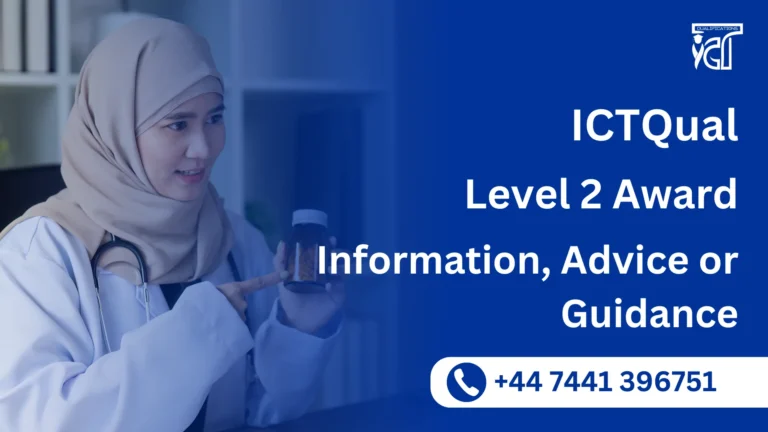In today’s competitive job market, having the right employability skills is essential for career success. Whether you’re entering the workforce for the first time or looking to improve your career prospects, the Focus Awards Level 2 Award in Employability Skills (RQF) is designed to provide you with the essential skills and knowledge to stand out to potential employers.
This qualification focuses on developing practical employability skills, which are highly valued by employers across all industries. In this blog post, we will provide a comprehensive overview of the Focus Awards Level 2 Award in Employability Skills (RQF), including its course introduction, benefits, learning outcomes, and who the course is best suited for.
The Focus Awards Level 2 Award in Employability Skills (RQF) is a nationally recognized qualification that provides learners with the foundational skills necessary for successful employment. This qualification is aimed at individuals looking to enter the workforce, those re-entering the job market after a period of absence, or anyone wanting to improve their employability prospects.
The Level 2 Award is part of the Regulated Qualifications Framework (RQF), ensuring that it adheres to high-quality standards recognized across the UK. The course is totally assignment-based, which allows learners to gain practical, real-world skills without the need for exams.The Level 2 Award in Employability Skills is designed to equip learners with the fundamental employability skills required to find and maintain employment in various industries. The course focuses on building skills such as communication, teamwork, problem-solving, and personal presentation. It also covers essential workplace behaviors such as punctuality, reliability, and taking initiative.
The course provides an excellent foundation for those who want to improve their job readiness and enhance their chances of securing their ideal role. Additionally, it equips learners with the skills they need to adapt to different working environments and be successful in the workplace.
The Focus Awards Level 2 Award in Employability Skills (RQF) is a highly beneficial qualification for anyone looking to improve their employability and secure a rewarding career. With its focus on developing practical, real-world skills, this course provides learners with the tools they need to thrive in the workplace.Recognized both in the UK and internationally, the Ofqual-regulated qualification offers flexibility, as it is assignment-based and can be tailored to suit individual learning needs. Whether you’re new to the job market, returning to work, or looking to develop your career, this qualification will provide you with the essential employability skills that employers value most.
Ready to enhance your employability and improve your career prospects? Enroll in the Focus Awards Level 2 Award in Employability Skills (RQF) today and take the first step toward a successful and rewarding career!
Focus Awards Level 2 Award in Employability Skills (RQF)
The Focus Awards Level 2 Award in Employability Skills (RQF) qualification consists of Total Qualification Time (TQT): 90, Guided Learning Hours (GLH): 72 and Credits : 9 for the completed qualification. Learners must achieve 9 credits from 6 mandatory units.
| Sr# | Unit Title | Credit | GLH |
|---|---|---|---|
| 1 | Preparing for an interview | 1 | 10 |
| 2 | Interview skills | 1 | 10 |
| 3 | Self-assessment | 2 | 10 |
| 4 | Effectiveness at work | 1 | 10 |
| 5 | Working in a team | 3 | 30 |
| 6 | Investigating rights and responsibilities at work | 1 | 10 |
GLH (Guided Learning Hours) and TQT (Total Qualification Time) are terms commonly used in vocational qualifications to help define the amount of time a learner is expected to spend on their studies.
1. GLH (Guided Learning Hours)
GLH refers to the number of hours a learner spends being directly taught, supervised, or supported during their course. This includes the time spent in activities such as:
- Classroom instruction
- Practical workshops
- One-on-one tutoring or mentoring sessions
- Online learning sessions with tutor support
In other words, GLH represents the time that learners are actively engaged with their instructors or learning activities.
2. TQT (Total Qualification Time)
TQT represents the total amount of time a learner is expected to invest in completing a qualification, including:
- GLH (Guided Learning Hours): Time spent on direct learning, as explained above.
- Self-Directed Learning: This includes time spent on independent study, research, assignment completion, preparation for exams, and any other work the learner does outside of direct teaching hours.
TQT is a broader measure that includes all the time required to achieve the qualification. It helps learners and employers understand the overall commitment required for the qualification.
Key Differences Between GLH and TQT:
- GLH focuses on direct learning with guidance or supervision.
- TQT includes GLH as well as independent study time and other learning-related activities.
Example:
If a qualification has a TQT of 600 hours and a GLH of 250 hours, it means the learner should spend 250 hours in direct learning (classroom, online, or tutor-led sessions) and 350 hours on independent study or research.
Here are the learning outcomes for the provided study units:
1. Preparing for an Interview (1 Unit, 10 Hours)
Learning Outcomes:
- Understand the importance of preparation before an interview.
- Demonstrate the ability to research the employer and the role to enhance interview performance.
- Identify strategies for presenting oneself effectively during the interview process.
- Develop a professional CV and cover letter tailored to the specific job role.
2. Interview Skills (1 Unit, 10 Hours)
Learning Outcomes:
- Demonstrate effective verbal and non-verbal communication during an interview.
- Understand how to answer common interview questions confidently and accurately.
- Showcase active listening skills during an interview.
- Develop techniques to manage interview anxiety and present oneself professionally.
3. Self-Assessment (2 Units, 20 Hours)
Learning Outcomes:
- Evaluate personal strengths and weaknesses in relation to employability skills.
- Identify areas for personal and professional development.
- Create a personal action plan to improve employability based on self-assessment results.
- Set measurable goals for self-improvement and track progress over time.
4. Effectiveness at Work (1 Unit, 10 Hours)
Learning Outcomes:
- Recognize key factors that contribute to personal effectiveness and productivity at work.
- Demonstrate the ability to manage time effectively and prioritize tasks.
- Understand how to maintain motivation and focus in the workplace.
- Develop strategies for improving efficiency and quality of work.
5. Working in a Team (3 Units, 30 Hours)
Learning Outcomes:
- Understand the importance of teamwork and collaboration in achieving organizational goals.
- Demonstrate effective communication skills within a team setting.
- Identify different roles within a team and how to contribute to team success.
- Develop problem-solving skills for resolving conflicts and challenges in team environments.
- Show respect for diversity and inclusion when working in a team.
6. Investigating Rights and Responsibilities at Work (Unit not specified, assumed 10 Hours)
Learning Outcomes:
- Understand the key rights and responsibilities of both employers and employees in the workplace.
- Identify relevant employment laws, such as contracts, health and safety, and anti-discrimination laws.
- Recognize the importance of respecting workplace policies and legal obligations.
- Be able to discuss and resolve workplace disputes related to rights and responsibilities effectively.
These learning outcomes aim to develop key employability skills that will help individuals prepare for the job market, improve their work performance, and enhance their overall career prospects.
Benefits of the Focus Awards Level 2 Award in Employability Skills (RQF)
The Focus Awards Level 2 Award in Employability Skills (RQF) offers a wide range of benefits for individuals looking to enhance their employability and career prospects. Here are some of the key advantages of completing this qualification:
- Enhanced Job Readiness
- This course equips learners with essential skills and knowledge needed to succeed in the workforce. By covering areas such as interview preparation, communication, teamwork, and time management, it ensures that individuals are ready to enter the job market with confidence and professionalism.
- Improved Employment Opportunities
- Completing the Level 2 Award in Employability Skills significantly boosts a candidate’s chances of securing a job. Employers highly value the skills developed in this course, such as effective communication, problem-solving, and the ability to work well in a team, making candidates more attractive to potential employers.
- Recognition and Credibility
- The qualification is Ofqual-regulated, meaning it meets the high standards set by the UK’s regulatory framework for qualifications. This provides learners with a recognized and credible certification that is respected by employers and educational institutions both in the UK and internationally.
- Globally Recognized Qualification
- As an internationally recognized qualification, the Focus Awards Level 2 Award in Employability Skills (RQF) can open up job opportunities not just in the UK, but across the globe. This makes it an excellent choice for individuals looking to enhance their career prospects worldwide.
- Develop Practical and Transferable Skills
- The course focuses on developing practical, real-world skills that are directly applicable to a variety of work environments. These transferable skills—such as problem-solving, self-assessment, and working in teams—can be used across a range of industries, providing flexibility and adaptability in the workplace.
- Assignment-Based Learning for Flexibility
- The course is entirely assignment-based, meaning learners can study at their own pace without the pressure of exams. This flexible approach allows individuals to balance their studies with work or other commitments, making it ideal for busy adults or those with other responsibilities.
- Increased Confidence
- By developing key employability skills and preparing for real-world job situations, learners build self-confidence. This confidence can make a significant difference during interviews, workplace interactions, and in handling workplace challenges, improving overall job performance.
- Improved Teamwork and Communication
- Effective communication and the ability to work as part of a team are essential in any job. The course helps learners improve these skills by teaching them how to communicate clearly, collaborate with others, and contribute positively to a team dynamic, all of which are highly valued by employers.
- Personal and Professional Development
- The Focus Awards Level 2 Award in Employability Skills (RQF) encourages self-assessment and reflection, helping learners identify their strengths and areas for development. This promotes both personal and professional growth, providing learners with the tools they need to improve their work ethic, productivity, and overall career prospects.
- Foundation for Further Education or Training
- This qualification acts as a stepping stone for those who wish to continue their education or undertake further vocational training. It provides a solid foundation for pursuing apprenticeships, vocational qualifications, or even further qualifications in specialized areas such as business administration, customer service, or hospitality.
- Affordable and Accessible
- Compared to many other qualifications, the Level 2 Award in Employability Skills (RQF) is a cost-effective way to gain essential skills. The flexible and accessible nature of the course allows learners from various backgrounds to gain valuable employability skills without breaking the bank.
- Supports Career Changers
- For individuals looking to change careers or re-enter the workforce after a break, this qualification provides the foundational skills required to transition successfully into a new role. It gives career changers the confidence to apply for jobs in different sectors, with the practical skills they need to succeed in a variety of job markets.
Who Is the Focus Awards Level 2 Award in Employability Skills (RQF) Best Suited For?
The Focus Awards Level 2 Award in Employability Skills (RQF) is ideal for a wide range of individuals looking to enhance their job readiness and employability prospects. Here are the groups who will benefit most from this course:
1. School Leavers
- Why it’s a fit: Recent school leavers who are entering the workforce for the first time will find this qualification invaluable. It provides them with the essential employability skills that many employers look for in candidates, such as effective communication, teamwork, and interview preparation.
- How it helps: This course equips young individuals with the tools they need to navigate the job market confidently, making them more competitive candidates for entry-level positions.
2. People Re-entering the Workforce
- Why it’s a fit: Individuals who have taken a break from work, whether due to family commitments, personal reasons, or long-term illness, will benefit from this course. It helps refresh and enhance their employability skills to successfully transition back into the workforce.
- How it helps: This course provides them with updated knowledge and key workplace skills, enabling them to integrate smoothly into the job market and secure employment opportunities.
3. Career Changers
- Why it’s a fit: For individuals seeking to switch careers or industries, the Focus Awards Level 2 Award in Employability Skills is an excellent choice. It provides the foundational skills that are transferable across a variety of sectors, enabling them to pursue new roles with confidence.
- How it helps: This qualification enhances the job-seeking abilities of career changers, allowing them to demonstrate essential employability skills that can be applied in a new field.
4. Young Adults Looking for Apprenticeships
- Why it’s a fit: Young adults who are considering apprenticeships or vocational training will find this qualification beneficial. The skills learned in this course are highly valued by employers offering apprenticeship programs.
- How it helps: By completing the course, young adults can increase their chances of securing apprenticeships, gaining practical experience in their chosen industry, and ultimately building their careers.
5. Individuals Seeking to Improve Employability for Entry-Level Jobs
- Why it’s a fit: If you’re aiming for an entry-level job but need to improve your employability prospects, this course is tailored for you. Whether you’re looking at positions in retail, hospitality, customer service, or administration, the course will provide the necessary skills to succeed.
- How it helps: The course focuses on key skills such as communication, teamwork, and problem-solving, all of which are vital for entry-level positions across multiple industries.
6. Job Seekers with Limited Experience
- Why it’s a fit: If you have little or no professional experience, this course offers a structured pathway to building the essential skills employers are seeking. It will help you gain the confidence and knowledge necessary to secure your first job or transition to a new role.
- How it helps: This qualification provides a clear understanding of the expectations of the workplace and the behaviors that will lead to success in various job roles.
7. Individuals Looking to Build Self-Confidence in the Job Market
- Why it’s a fit: If you struggle with confidence in interviews or the job application process, the Focus Awards Level 2 Award in Employability Skills will help you build the skills and self-assurance you need. This course prepares you for interviews, teaches effective communication, and helps you present yourself professionally.
- How it helps: The course provides practical strategies for job seekers, increasing their confidence and improving their ability to succeed in job interviews and workplace scenarios.
8. Employers and Organizations Looking to Upskill Their Workforce
- Why it’s a fit: Employers who want to upskill their staff or improve the employability of potential hires will find this course beneficial. It can be used to develop the fundamental skills of employees or individuals they are looking to employ.
- How it helps: By enrolling employees in this qualification, employers can ensure their workforce is equipped with key employability skills, enhancing productivity and overall job satisfaction.
Entry Requirements
Register Now
Qualification Process
Qualification Process for the Focus Awards Level 2 Award in Employability Skills (RQF)
- Self-Assessment:
Begin by evaluating your eligibility to ensure you meet the qualification requirements, including work experience, knowledge, and language proficiency. - Registration:
Complete your registration by submitting the required documents, including a scanned copy of a valid ID, and paying the registration fee. - Induction:
An assessor will conduct an induction to confirm your eligibility for the course and explain the evidence requirements. If you do not meet the criteria, your registration will be canceled, and the fee will be refunded. - Assignmnets & Evidence Submission:
Provide all assignmnets and the necessary evidence based on the assessment criteria outlined in the course. If you are unsure of the required evidence, consult with the assessor for guidance on the type and nature of evidence needed. - Feedback and Revision:
The assessor will review your submitted evidence and provide feedback. Evidence that meets the criteria will be marked as “Criteria Met,” while any gaps will be identified. You will be asked to revise and resubmit if needed. - Competence Evidence:
Submit final evidence demonstrating that all learning outcomes have been met. This evidence will be marked as “Criteria Met” by the assessor once it is satisfactory. - Internal Quality Assurance (IQA):
The Internal Quality Assurance Verifier (IQA) will review your evidence to ensure consistency, quality, and compliance with standards. - External Verification:
The IQA will submit your portfolio to Focus Award External Quality Assurance Verifiers (EQA) for final confirmation. The EQA may contact you directly to verify the authenticity of your evidence. - Certification:
Upon successful completion of all checks, FOCUS AWARD will issue your official certificate, confirming that you have attained the Focus Awards Level 2 Award in Employability Skills (RQF).







